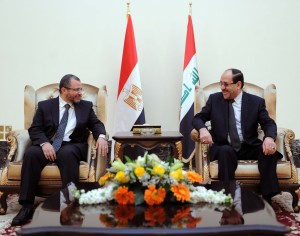
(AFP Photo)
By: Lamia Nabil
Egypt and Iraq have signed an agreement which will supply Egypt with 4 million barrels of Iraqi crude oil per month and 4,000 tonnes of diesel per day.
The agreement was concluded during Prime Minister Hesham Qandil’s recent visit to Iraq.
The oil will be supplied to Egypt via pipelines across the Gulf of Aqaba.
Minister of petroleum Ossama Kamal said he expected a “breakthrough” in the fuel shortage crisis currently gripping the nation after the Iraqi oil agreement, according to his press conference last Monday.
Kamal also said that the agreement will contribute to fill part of the gap between Egypt’s production of diesel, currently 22,000 tonnes per day, and its consumption, currently 35,000 tonnes per day.
An Egyptian, Iraqi, and Jordanian tripartite meeting will take place during a week to sign the $17bn project’s general framework.
Professor and Chair of the Department of Petroleum and Energy Engineering at the American University in Cairo (AUC) Magdy Nasrallah said that this agreement was a step in the right direction, as it constituted “part of a solution that we must have especially at this critical time”.
The main benefit of this agreement, he said, is that some of this crude oil will go directly to the petrochemical plants and will be used to process crude oil into finished petroleum products.
Nasrallah added, however, that the amount of oil supplied to Egypt as a result of the deal is not enough stem the current shortage completely because some of the finished products will be sold on the domestic market, while others will be exported.
“It will certainly cost the government more money to process it but there are many petrochemical plants currently not working because we don’t have enough crude to satisfy the local market and the returns will be significantly high.”
Nasrallah added, however: “I trust the minister of petroleum as petrochemicals is his specialty.”
Professor and Researcher at the Egyptian Petroleum Research Institute (EPRI) Mohamed Al-Sukari said that there are many refineries currently not working, and that the amount of crude supplied as part of the agreement will help restart these refineries in order to refine crude to finished products and to reduce the gap.
He also added, though, that this will still not fulfil domestic demand.



